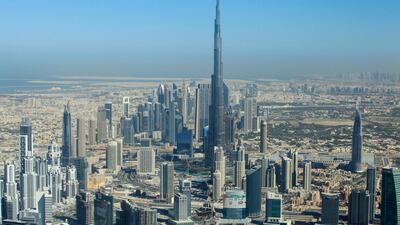Rating agency Moody’s Investors Service affirmed a stable outlook for GCC non-financial corporates in the coming 12 to 18 months, with regional trends continuing next year, but the outlook for companies in Turkey and South Africa remains negative, it said.
“The drivers of the stable outlook on GCC companies are the generally supportive oil prices, resulting in narrowing fiscal deficits, coupled with governments’ ongoing commitment towards public spending and supportive stance towards government-related issuers,” Moody’s said in a report on Thursday.
The International Monetary Fund in October raised its economic growth forecasts for the six Gulf Cooperation Council States, to 2.9 per cent for 2018 from 1.9 per cent forecast in July. The recovery of global oil prices after a three-year downturn have lifted economies of the regional oil exporters and boosted investor sentiment.
Oil prices – which reached $85 per barrel this year, and are now hovering at $60 per barrel – have supported GCC governments’ efforts to narrow fiscal deficits, and boost public spending after region-wide cutbacks since 2014, Moody’s said in its report.
The outlook for non-financial corporates in Turkey and South Africa however remains negative for the coming 12 to 18 months, the agency said.
For Turkish companies, the key drivers of the negative outlook include high foreign exchange volatility, tighter financial conditions and limited clarity on policy direction.
__________
Read more:
Moody's says Gulf banks' 2019 outlook stable as oil prices boost state spending
Moody’s affirms stable outlook for Jordan on fiscal reforms and GCC bailout
__________
The impact of those factors are compounded by expectations of economic contraction in Turkey in 2019, Moody’s added. Turkey’s economy is expected to shrink by 2 per cent in 2019 followed by a moderate 3 per cent recovery in 2020, the report said.
For South African companies, the negative outlook is driven by the country’s persistent low growth and continued political uncertainty, which has depressed business and consumer demand this year. South Africa's economy is expected to grow 1.3 per cent in 2019 and 1.5 per cent in 2020, according to Moody’s.
Overall, corporates with currency mismatches between earnings and debt remain especially vulnerable, the agency said. In addition, Turkish corporates tend to be more vulnerable than South African corporates given their higher degree of foreign currency borrowings.
“While the outlook for companies in Turkey, South Africa and GCC remain unchanged versus last year, the diverging regional trends will continue into 2019,” added Moody’s vice-president Rehan Akbar.

